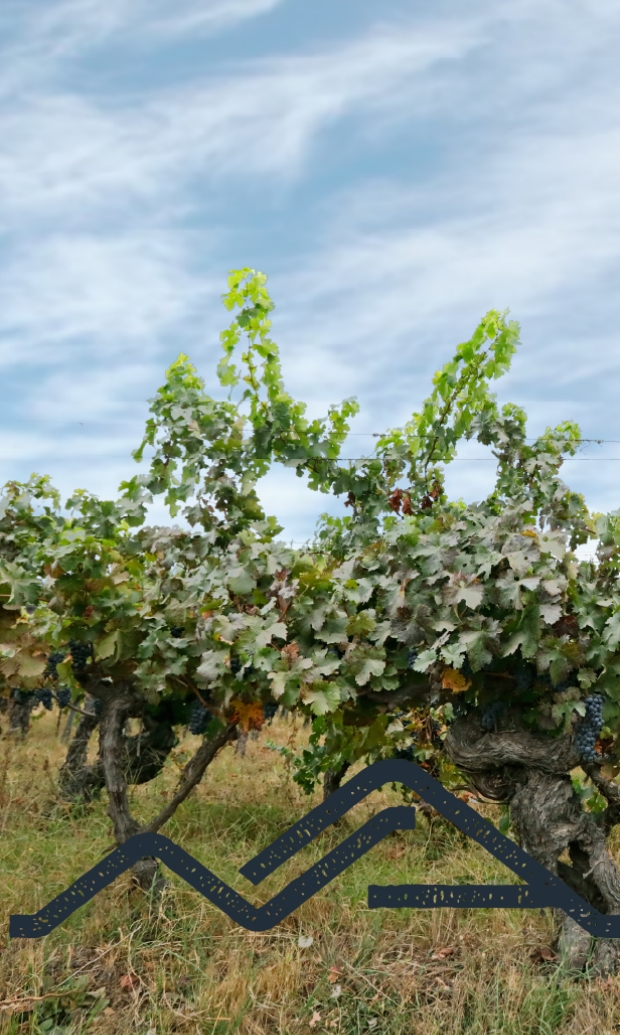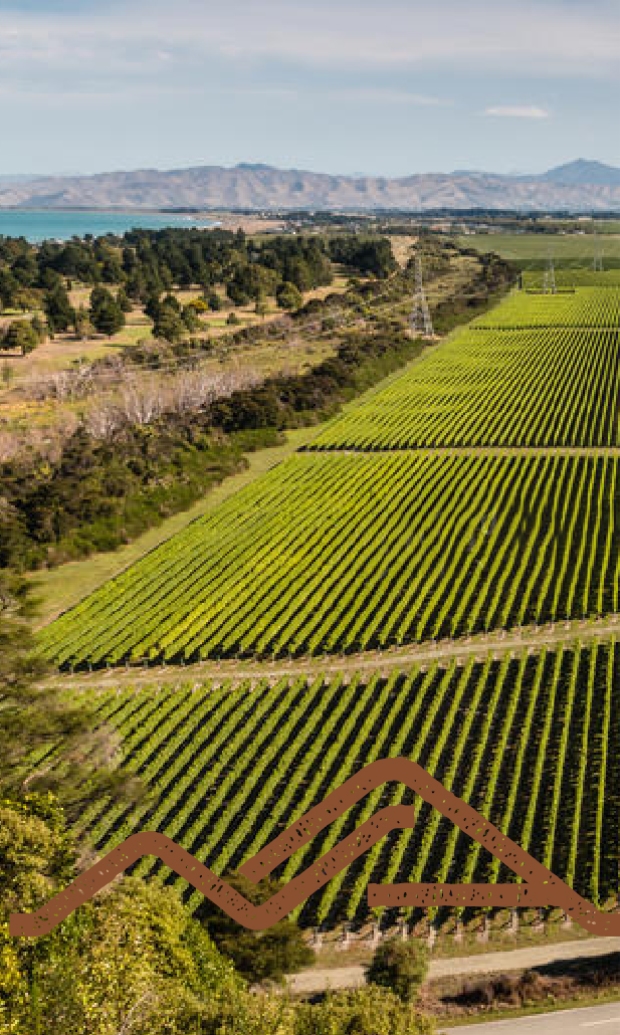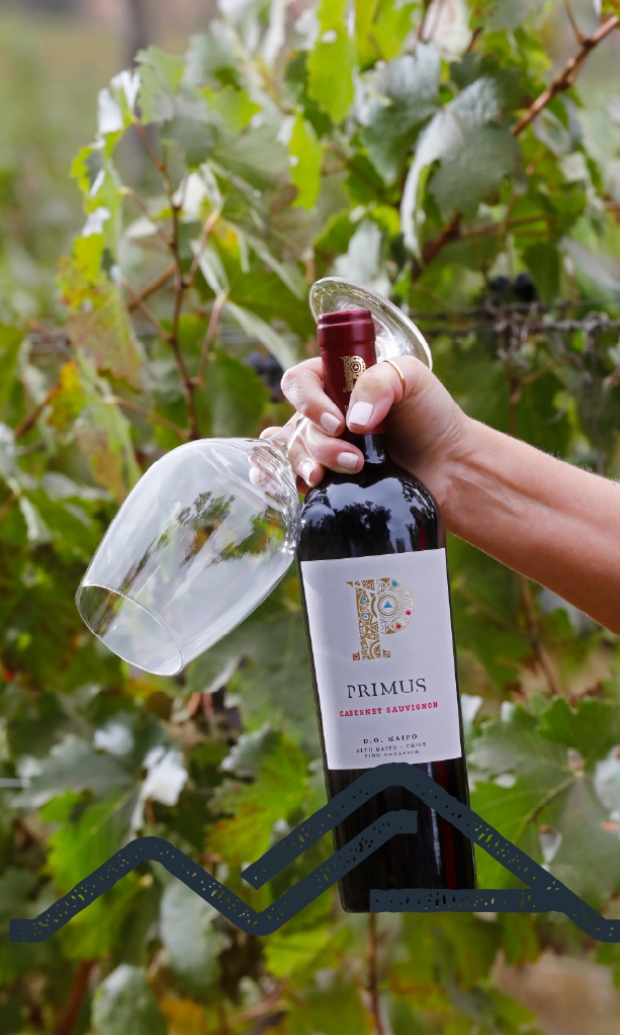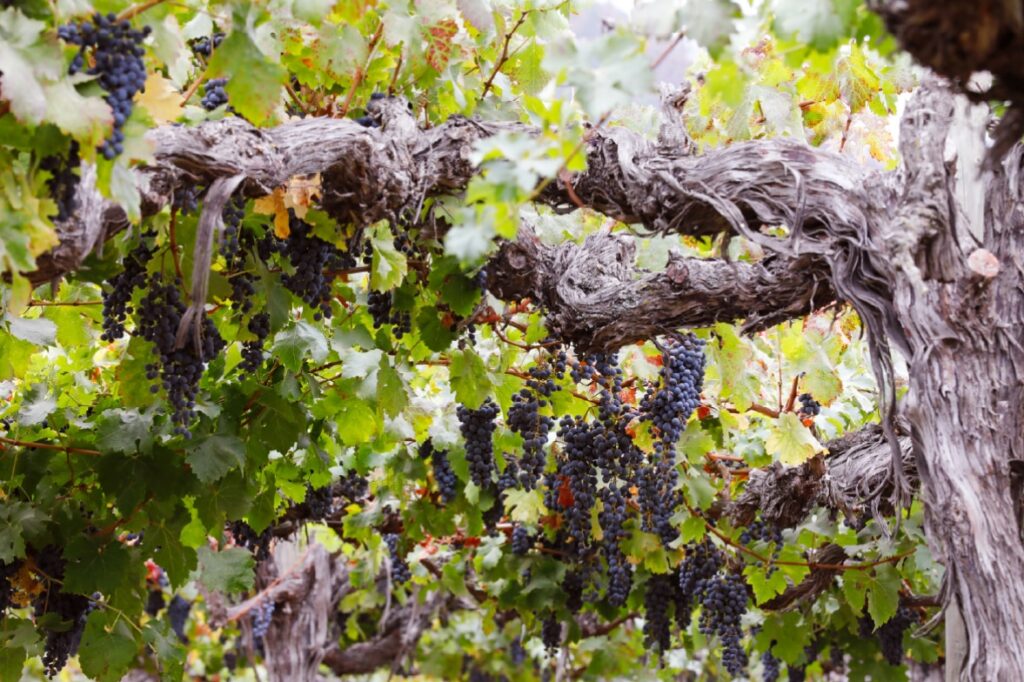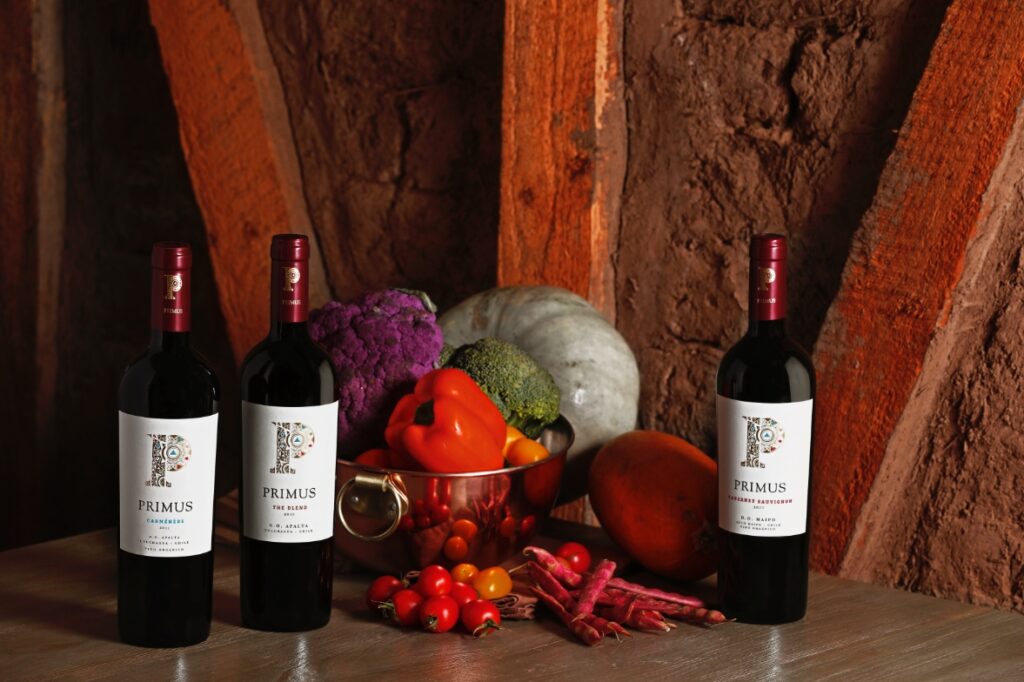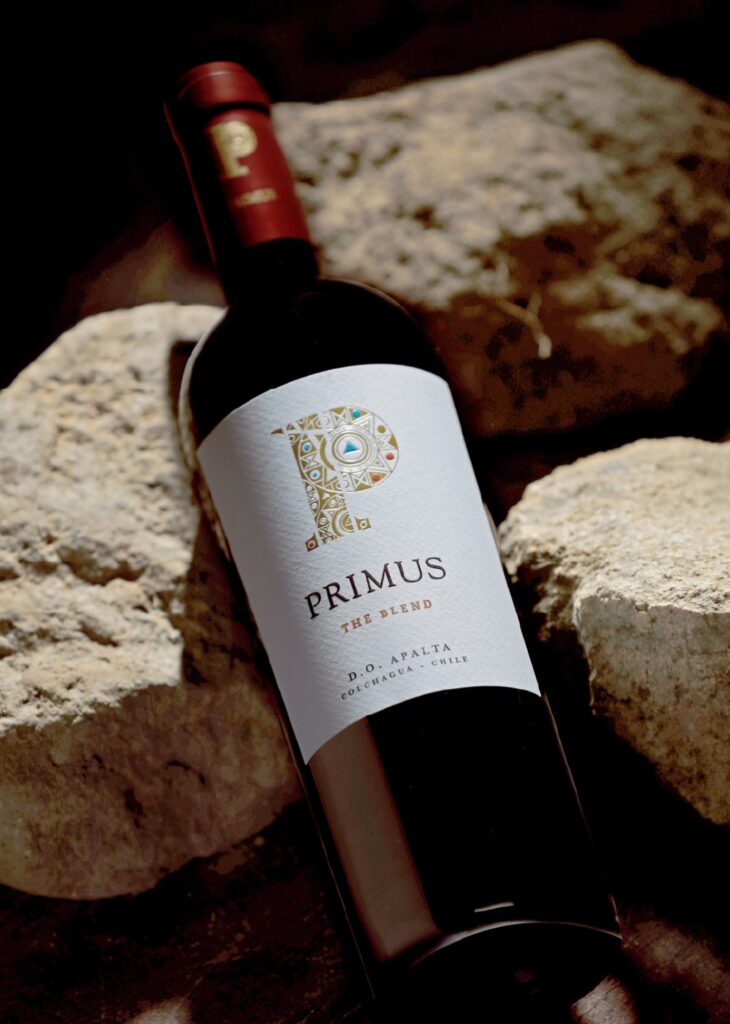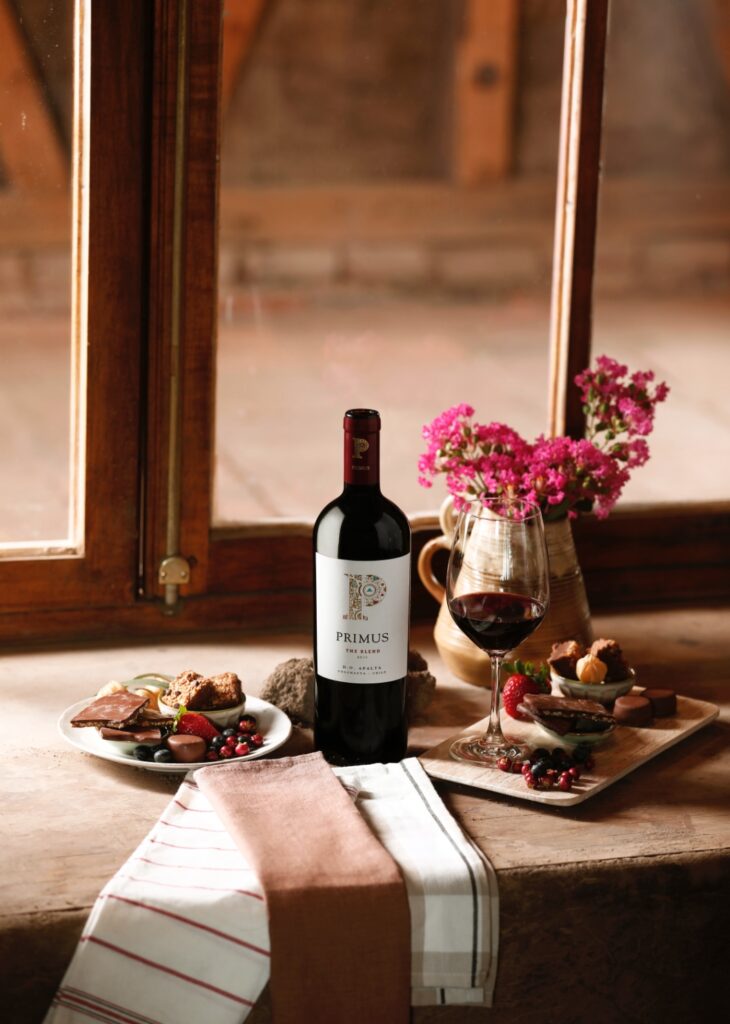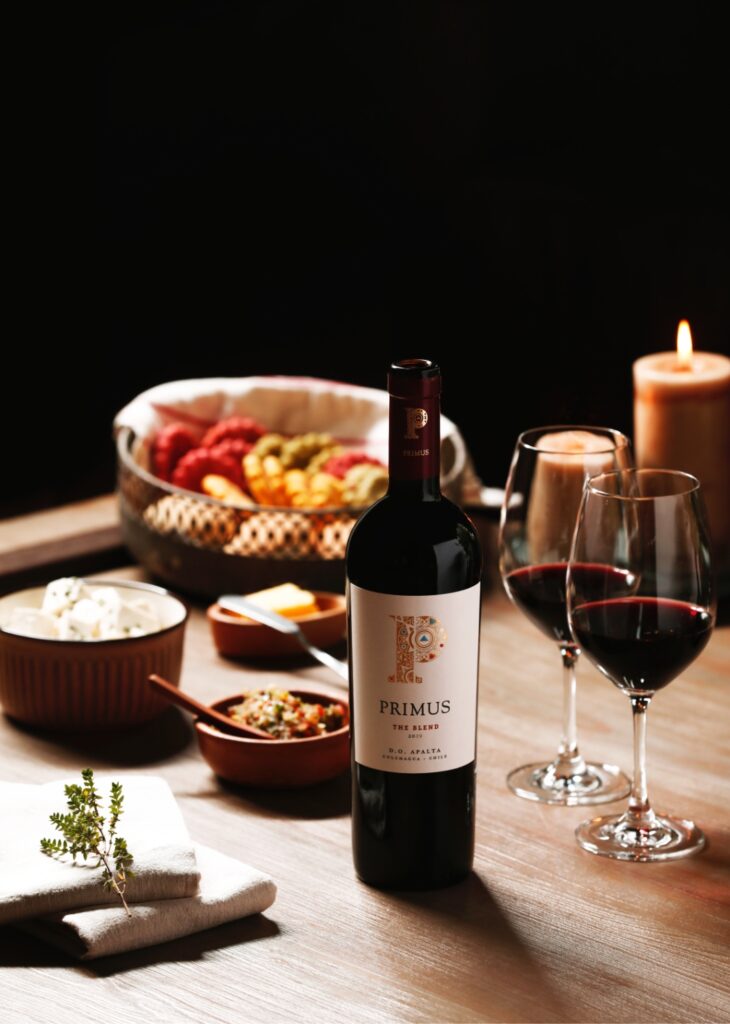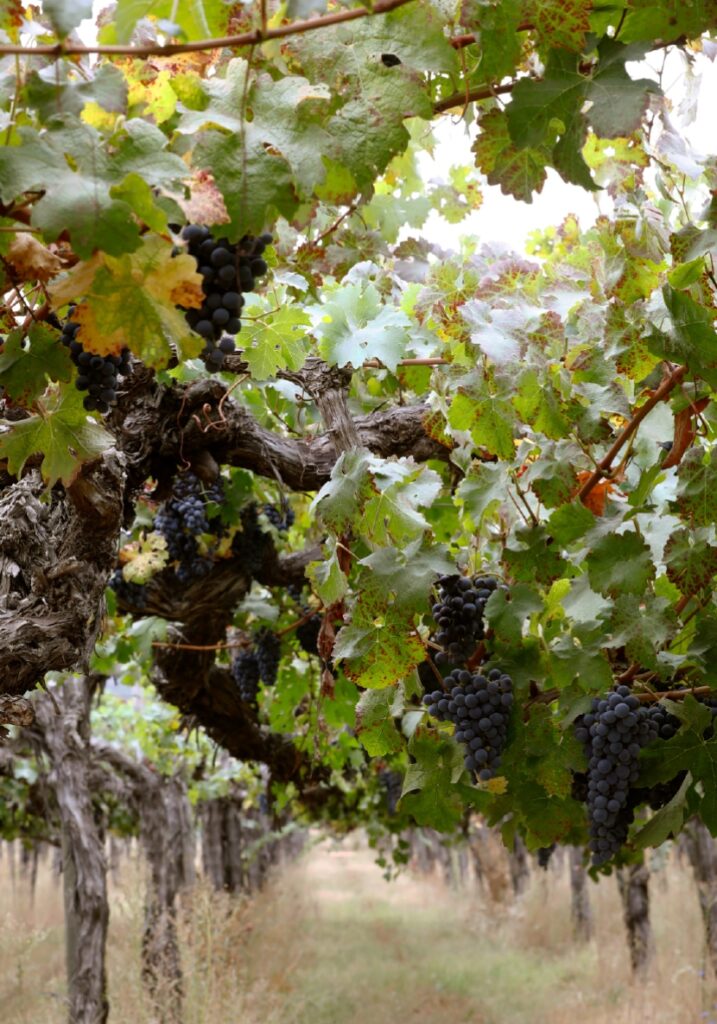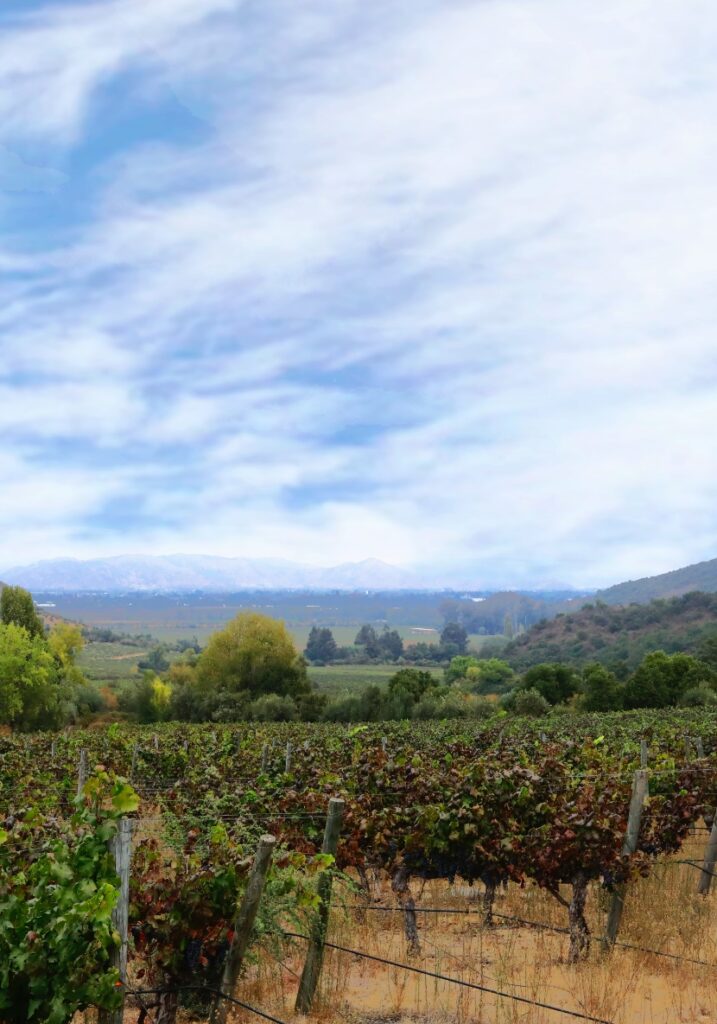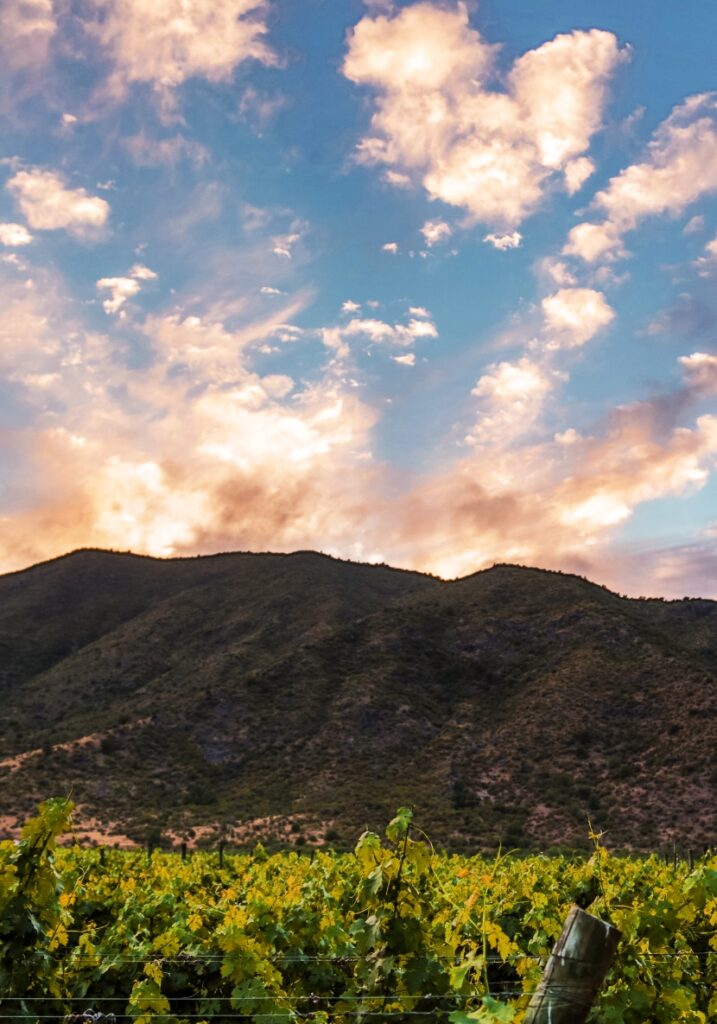Concours Mondial de Bruxelles · 92
Primus
The Essence of Apalta
It came about at a time when the vision of wine in Chile was very conservative, never moving away from monovarietal wines. That was when our founder - a true visionary - took the best red wines from Chile’s two most emblematic varieties and proceeded to combine them…
From the Latin 'Primus', it means the essential, that which is fundamental, and that is precisely what their wines propose.
A brand that has a story to tell, that has matured and now knows how to distinguish what is truly valuable and most important in a wine. Primus traveled through the Casablanca and Maipo Valleys in its early years, innovating and daring to blend different grape varieties, breaking paradigms, and creating the first blend in its category. This allowed it to explore, learn, taste, and make mistakes, to be in the valley and on the slopes, always seeking and managing to extract the best from each place, from each experiment. Today, already mature, it has come to stay in the Apalta Valley. After many stories and adventures, it has complete certainty of its identity, who it is, and who it wants to be.
Today, it has all the knowledge it needs to achieve the maximum expression of this valley through a respectful winemaking process based on the principles of regenerative organic and biodynamic agriculture. Primus is much more than wines from the Apalta Valley.
Primus wines enhance this place's unique essence, giving freedom and space for the vineyard's full potential to express itself authentically, with minimal human intervention.
Wines that know that the essential lies in its soils allow its grapes to express themselves freely in contact with the unique characteristics of this terroir, resulting in a wine known for its elegance and silkiness, providing an intense and balanced experience on the palate.
Are wines that don't need grand introductions or embellishments because their history and character speak for them.
Primus wines embody the virtues of the soil in which it was made and, at the same time, tell the story of Apalta and what happens in its vineyards.
Those who already know them do not abandon them because they know these wines will never disappoint them.
The grapes for the Primus wines come from the slopes of the property and a special parronal of Cabernet Sauvignon that is more than 80 years old. The grapes are manually harvested and fermented exclusively in open-topped tanks with native yeasts to bring out the maximum potential of each variety. The wine is aged in a mixture of containers - 500-litre foudres and French oak barrels - thus completing its evolution and delivering expressive, highly elegant wines with great balance and freshness.
A brand that has a story to tell, that has matured and now knows how to distinguish what is truly valuable and most important in a wine. Primus traveled through the Casablanca and Maipo Valleys in its early years, innovating and daring to blend different grape varieties, breaking paradigms, and creating the first blend in its category. This allowed it to explore, learn, taste, and make mistakes, to be in the valley and on the slopes, always seeking and managing to extract the best from each place, from each experiment. Today, already mature, it has come to stay in the Apalta Valley. After many stories and adventures, it has complete certainty of its identity, who it is, and who it wants to be.
Today, it has all the knowledge it needs to achieve the maximum expression of this valley through a respectful winemaking process based on the principles of regenerative organic and biodynamic agriculture. Primus is much more than wines from the Apalta Valley.
Primus wines enhance this place's unique essence, giving freedom and space for the vineyard's full potential to express itself authentically, with minimal human intervention.
Wines that know that the essential lies in its soils allow its grapes to express themselves freely in contact with the unique characteristics of this terroir, resulting in a wine known for its elegance and silkiness, providing an intense and balanced experience on the palate.
Are wines that don't need grand introductions or embellishments because their history and character speak for them.
Primus wines embody the virtues of the soil in which it was made and, at the same time, tell the story of Apalta and what happens in its vineyards.
Those who already know them do not abandon them because they know these wines will never disappoint them.
The grapes for the Primus wines come from the slopes of the property and a special parronal of Cabernet Sauvignon that is more than 80 years old. The grapes are manually harvested and fermented exclusively in open-topped tanks with native yeasts to bring out the maximum potential of each variety. The wine is aged in a mixture of containers - 500-litre foudres and French oak barrels - thus completing its evolution and delivering expressive, highly elegant wines with great balance and freshness.
/ Carménère
Year
D. O. Apalta
Valle de Colchahua
Tasting notes | 2021
Aromas of red fruits, cedar, and boldo. On the palate, it is fresh and fruity, with flavors of cherry and hints of pepper and rosemary. Silky, with velvety tannins and good volume on the palate. The grapes are hand-harvested, double-selected, and macerated in open steel tanks with native yeast. After fermentation, they remain on their skins to give it structure and soften its finish. The best lots of the harvest are selected and blended, then aged in French oak barrels for twelve months.
Organic vineyards. Well-drained clay-loam soils with rocky material.
12 MONTHS IN FRENCH OAK BARRELS, 18% NEW
D. O. Apalta
Valle de Colchahua
Tasting notes | 2020
Aromas of red fruits, cedar, and boldo. On the palate, it is fresh and fruity, with flavors of cherry and hints of pepper and rosemary. Silky, with velvety tannins and good volume on the palate. The grapes are hand-harvested, double-selected, and macerated in open steel tanks with native yeast. After fermentation, they remain on their skins to give it structure and soften its finish. The best lots of the harvest are selected and blended, then aged in French oak barrels for twelve months.
Organic vineyards. Well-drained clay-loam soils with rocky material.
12 MONTHS IN FRENCH OAK BARRELS, 18% NEW
D. O. Apalta
Valle de Colchahua
Tasting notes | 2019
Aromas of red fruits, cedar, and boldo. On the palate, it is fresh and fruity, with flavors of cherry and hints of pepper and rosemary. Silky, with velvety tannins and good volume on the palate. The grapes are hand-harvested, double-selected, and macerated in open steel tanks with native yeast. After fermentation, they remain on their skins to give it structure and soften its finish. The best lots of the harvest are selected and blended, then aged in French oak barrels for twelve months.
Organic vineyards. Well-drained clay-loam soils with rocky material.
12 MONTHS IN FRENCH OAK BARRELS, 18% NEW
D. O. Apalta
Valle de Colchahua
Tasting notes | 2018
Aromas of red fruits, cedar, and boldo. On the palate, it is fresh and fruity, with flavors of cherry and hints of pepper and rosemary. Silky, with velvety tannins and good volume on the palate. The grapes are hand-harvested, double-selected, and macerated in open steel tanks with native yeast. After fermentation, they remain on their skins to give it structure and soften its finish. The best lots of the harvest are selected and blended, then aged in French oak barrels for twelve months.
Organic vineyards. Well-drained clay-loam soils with rocky material.
12 MONTHS IN FRENCH OAK BARRELS, 18% NEW
D. O. Apalta
Valle de Colchahua
Tasting notes | 2017
Aromas of red fruits, cedar, and boldo. On the palate, it is fresh and fruity, with flavors of cherry and hints of pepper and rosemary. Silky, with velvety tannins and good volume on the palate. The grapes are hand-harvested, double-selected, and macerated in open steel tanks with native yeast. After fermentation, they remain on their skins to give it structure and soften its finish. The best lots of the harvest are selected and blended, then aged in French oak barrels for twelve months.
Organic vineyards. Well-drained clay-loam soils with rocky material.
12 MONTHS IN FRENCH OAK BARRELS, 18% NEW
D. O. Apalta
Valle de Colchahua
Tasting notes | 2016
Aromas of red fruits, cedar, and boldo. On the palate, it is fresh and fruity, with flavors of cherry and hints of pepper and rosemary. Silky, with velvety tannins and good volume on the palate. The grapes are hand-harvested, double-selected, and macerated in open steel tanks with native yeast. After fermentation, they remain on their skins to give it structure and soften its finish. The best lots of the harvest are selected and blended, then aged in French oak barrels for twelve months.
Organic vineyards. Well-drained clay-loam soils with rocky material.
12 MONTHS IN FRENCH OAK BARRELS, 18% NEW
D. O. Apalta
Valle de Colchahua
Tasting notes | 2015
Aromas of red fruits, cedar, and boldo. On the palate, it is fresh and fruity, with flavors of cherry and hints of pepper and rosemary. Silky, with velvety tannins and good volume on the palate. The grapes are hand-harvested, double-selected, and macerated in open steel tanks with native yeast. After fermentation, they remain on their skins to give it structure and soften its finish. The best lots of the harvest are selected and blended, then aged in French oak barrels for twelve months.
Organic vineyards. Well-drained clay-loam soils with rocky material.
12 MONTHS IN FRENCH OAK BARRELS, 18% NEW
Mediterranean climate with well-defined seasons and rainfall concentrated in winter.
45 kilometers east of the Pacific Ocean, in the renowned Apalta region.
Vineyards with a south-facing orientation, on the ancient terraces of the Tinguiririca River.
Beef empanadas, lamb curry, and stews.
60°F
Mediterranean climate with well-defined seasons and rainfall concentrated in winter.
Vineyards with a south-facing orientation, on the ancient terraces of the Tinguiririca River.
Vineyards with a south-facing orientation, on the ancient terraces of the Tinguiririca River.
Beef empanadas, lamb curry, and stews.
60°F
Mediterranean climate with well-defined seasons and rainfall concentrated in winter.
45 kilometers east of the Pacific Ocean, in the renowned Apalta region.
Vineyards with a south-facing orientation, on the ancient terraces of the Tinguiririca River.
Beef empanadas, lamb curry, and stews.
60°F
Mediterranean climate with well-defined seasons and rainfall concentrated in winter.
45 kilometers east of the Pacific Ocean, in the renowned Apalta region.
Vineyards with a south-facing orientation, on the ancient terraces of the Tinguiririca River.
Beef empanadas, lamb curry, and stews.
60°F
Mediterranean climate with well-defined seasons and rainfall concentrated in winter.
45 kilometers east of the Pacific Ocean, in the renowned Apalta region.
Vineyards with a south-facing orientation, on the ancient terraces of the Tinguiririca River.
Beef empanadas, lamb curry, and stews.
60°F
Mediterranean climate with well-defined seasons and rainfall concentrated in winter.
45 kilometers east of the Pacific Ocean, in the renowned Apalta region.
Vineyards with a south-facing orientation, on the ancient terraces of the Tinguiririca River.
Beef empanadas, lamb curry, and stews.
60°F
Mediterranean climate with well-defined seasons and rainfall concentrated in winter.
45 kilometers east of the Pacific Ocean, in the renowned Apalta region.
Vineyards with a south-facing orientation, on the ancient terraces of the Tinguiririca River.
Beef empanadas, lamb curry, and stews.
60°F
Accolides
/ Cabernet Sauvignon
Year
D. O. Alto Maipo
Valle del Maipo
Tasting notes | 2020
Vivid aromas of blackberry, blueberry, and dried cherry intermingle with hints of vanilla and cedar. Intense and balanced on the palate, with a silky texture, fine tannins, and a persistent finish. The grapes are harvested by hand, double-selected, and macerated in open steel tanks with native yeast. After fermentation, they remain on their skins to give it structure and soften its finish.
The finest lots from the harvest are selected and blended, then aged in French oak barrels for twelve months.
Ancient terraces of the Maipo. Soils with good drainage, loam-silt texture, influenced by minerals from the mountains.
12 months in French oak 20% new oak barrels.
D. O. Apalta
Valle de Colchahua
Tasting notes | 2019
Vivid aromas of blackberry, blueberry, and dried cherry intermingle with hints of vanilla and cedar. Intense and balanced on the palate, with a silky texture, fine tannins, and a persistent finish. The grapes are harvested by hand, double-selected, and macerated in open steel tanks with native yeast. After fermentation, they remain on their skins to give it structure and soften its finish.
The finest lots from the harvest are selected and blended, then aged in French oak barrels for twelve months.
Ancient terraces of the Maipo. Soils with good drainage, loam-silt texture, influenced by minerals from the mountains.
12 months in French oak 20% new oak barrels.
D. O. Apalta
Valle de Colchahua
Tasting notes | 2018
Vivid aromas of blackberry, blueberry, and dried cherry intermingle with hints of vanilla and cedar. Intense and balanced on the palate, with a silky texture, fine tannins, and a persistent finish. The grapes are harvested by hand, double-selected, and macerated in open steel tanks with native yeast. After fermentation, they remain on their skins to give it structure and soften its finish.
The finest lots from the harvest are selected and blended, then aged in French oak barrels for twelve months.
Ancient terraces of the Maipo. Soils with good drainage, loam-silt texture, influenced by minerals from the mountains.
12 months in French oak 20% new oak barrels.
D. O. Apalta
Valle de Colchahua
Tasting notes | 2017
Vivid aromas of blackberry, blueberry, and dried cherry intermingle with hints of vanilla and cedar. Intense and balanced on the palate, with a silky texture, fine tannins, and a persistent finish. The grapes are harvested by hand, double-selected, and macerated in open steel tanks with native yeast. After fermentation, they remain on their skins to give it structure and soften its finish.
The finest lots from the harvest are selected and blended, then aged in French oak barrels for twelve months.
Ancient terraces of the Maipo. Soils with good drainage, loam-silt texture, influenced by minerals from the mountains.
12 months in French oak 20% new oak barrels.
D. O. Apalta
Valle de Colchahua
Tasting notes | 2016
Vivid aromas of blackberry, blueberry, and dried cherry intermingle with hints of vanilla and cedar. Intense and balanced on the palate, with a silky texture, fine tannins, and a persistent finish. The grapes are harvested by hand, double-selected, and macerated in open steel tanks with native yeast. After fermentation, they remain on their skins to give it structure and soften its finish.
The finest lots from the harvest are selected and blended, then aged in French oak barrels for twelve months.
Ancient terraces of the Maipo. Soils with good drainage, loam-silt texture, influenced by minerals from the mountains.
12 months in French oak 20% new oak barrels.
D. O. Apalta
Valle de Colchahua
Tasting notes | 2015
Vivid aromas of blackberry, blueberry, and dried cherry intermingle with hints of vanilla and cedar. Intense and balanced on the palate, with a silky texture, fine tannins, and a persistent finish. The grapes are harvested by hand, double-selected, and macerated in open steel tanks with native yeast. After fermentation, they remain on their skins to give it structure and soften its finish.
The finest lots from the harvest are selected and blended, then aged in French oak barrels for twelve months.
Ancient terraces of the Maipo. Soils with good drainage, loam-silt texture, influenced by minerals from the mountains.
12 months in French oak 20% new oak barrels.
D. O. Apalta
Valle de Colchahua
Tasting notes | 2014
Vivid aromas of blackberry, blueberry, and dried cherry intermingle with hints of vanilla and cedar. Intense and balanced on the palate, with a silky texture, fine tannins, and a persistent finish. The grapes are harvested by hand, double-selected, and macerated in open steel tanks with native yeast. After fermentation, they remain on their skins to give it structure and soften its finish.
The finest lots from the harvest are selected and blended, then aged in French oak barrels for twelve months.
Ancient terraces of the Maipo. Soils with good drainage, loam-silt texture, influenced by minerals from the mountains.
12 months in French oak 20% new oak barrels.
Mediterranean climate, with well-defined seasons and precipitation concentrated in the winter.
The Andes Mountains cool the nights, resulting in a slow ripening of the grapes.
Coriander-crusted steak and lamb.
60°F
Mediterranean climate, with well-defined seasons and precipitation concentrated in the winter.
The Andes Mountains cool the nights, resulting in a slow ripening of the grapes.
Coriander-crusted steak and lamb.
60°F
Mediterranean climate, with well-defined seasons and precipitation concentrated in the winter.
The Andes Mountains cool the nights, resulting in a slow ripening of the grapes.
Coriander-crusted steak and lamb.
60°F
Mediterranean climate, with well-defined seasons and precipitation concentrated in the winter.
The Andes Mountains cool the nights, resulting in a slow ripening of the grapes.
Coriander-crusted steak and lamb.
60°F
Mediterranean climate, with well-defined seasons and precipitation concentrated in the winter.
The Andes Mountains cool the nights, resulting in a slow ripening of the grapes.
Coriander-crusted steak and lamb.
60°F
Mediterranean climate, with well-defined seasons and precipitation concentrated in the winter.
The Andes Mountains cool the nights, resulting in a slow ripening of the grapes.
Coriander-crusted steak and lamb.
60°F
Mediterranean climate, with well-defined seasons and precipitation concentrated in the winter.
The Andes Mountains cool the nights, resulting in a slow ripening of the grapes.
Coriander-crusted steak and lamb.
60°F
/ The Blend
Year
D. O. Apalta
Valle de Colchahua
Tasting notes | 2020
An expressive blend that combines the diversity of this unique place in Apalta. This harvest, the Cabernet Sauvignon is the foundation, providing structure that perfectly complements the black fruit and spices of the Syrah. The Malbec and Carmenere contribute silkiness, hints of black pepper, and density, while the Cabernet Franc delivers elegance and persistence combined with the smooth and complex finish of the Petit Verdot.
Organic vineyards, with well-drained clay-loam soil and rocky material.
33% 5000 L foudres, 66% French oak barrels, 18 months.
D. O. Apalta
Valle de Colchahua
Tasting notes | 2019
An expressive blend that combines the diversity of this unique place in Apalta. This harvest, the Cabernet Sauvignon is the foundation, providing structure that perfectly complements the black fruit and spices of the Syrah. The Malbec and Carmenere contribute silkiness, hints of black pepper, and density, while the Cabernet Franc delivers elegance and persistence combined with the smooth and complex finish of the Petit Verdot.
Organic vineyards, with well-drained clay-loam soil and rocky material.
33% 5000 L foudres, 66% French oak barrels, 18 months.
D. O. Apalta
Valle de Colchahua
Tasting notes | 2018
An expressive blend that combines the diversity of this unique place in Apalta. This harvest, the Cabernet Sauvignon is the foundation, providing structure that perfectly complements the black fruit and spices of the Syrah. The Malbec and Carmenere contribute silkiness, hints of black pepper, and density, while the Cabernet Franc delivers elegance and persistence combined with the smooth and complex finish of the Petit Verdot.
Organic vineyards, with well-drained clay-loam soil and rocky material.
33% 5000 L foudres, 66% French oak barrels, 18 months.
D. O. Apalta
Valle de Colchahua
Tasting notes | 2017
An expressive blend that combines the diversity of this unique place in Apalta. This harvest, the Cabernet Sauvignon is the foundation, providing structure that perfectly complements the black fruit and spices of the Syrah. The Malbec and Carmenere contribute silkiness, hints of black pepper, and density, while the Cabernet Franc delivers elegance and persistence combined with the smooth and complex finish of the Petit Verdot.
Organic vineyards, with well-drained clay-loam soil and rocky material.
33% 5000 L foudres, 66% French oak barrels, 18 months.
D. O. Apalta
Valle de Colchahua
Tasting notes | 2016
An expressive blend that combines the diversity of this unique place in Apalta. This harvest, the Cabernet Sauvignon is the foundation, providing structure that perfectly complements the black fruit and spices of the Syrah. The Malbec and Carmenere contribute silkiness, hints of black pepper, and density, while the Cabernet Franc delivers elegance and persistence combined with the smooth and complex finish of the Petit Verdot.
Organic vineyards, with well-drained clay-loam soil and rocky material.
33% 5000 L foudres, 66% French oak barrels, 18 months.
D. O. Apalta
Valle de Colchahua
Tasting notes | 2015
An expressive blend that combines the diversity of this unique place in Apalta. This harvest, the Cabernet Sauvignon is the foundation, providing structure that perfectly complements the black fruit and spices of the Syrah. The Malbec and Carmenere contribute silkiness, hints of black pepper, and density, while the Cabernet Franc delivers elegance and persistence combined with the smooth and complex finish of the Petit Verdot.
Organic vineyards, with well-drained clay-loam soil and rocky material.
33% 5000 L foudres, 66% French oak barrels, 18 months.
D. O. Apalta
Valle de Colchahua
Tasting notes | 2014
An expressive blend that combines the diversity of this unique place in Apalta. This harvest, the Cabernet Sauvignon is the foundation, providing structure that perfectly complements the black fruit and spices of the Syrah. The Malbec and Carmenere contribute silkiness, hints of black pepper, and density, while the Cabernet Franc delivers elegance and persistence combined with the smooth and complex finish of the Petit Verdot.
Organic vineyards, with well-drained clay-loam soil and rocky material.
33% 5000 L foudres, 66% French oak barrels, 18 months.
Mediterranean climate, with well-defined seasons and precipitation concentrated in the winter.
Vineyards surrounded by native forests, where the Andes and Coastal mountain ranges converge. The grapes used in this wine come from the high slopes of the property.
Vineyards with a south-facing orientation, on the ancient terraces of the Tinguiririca River.
Grilled or oven-baked meats and mature cheeses.
14ºC
Mediterranean climate, with well-defined seasons and precipitation concentrated in the winter.
Vineyards surrounded by native forests, where the Andes and Coastal mountain ranges converge. The grapes used in this wine come from the high slopes of the property.
Vineyards with a south-facing orientation, on the ancient terraces of the Tinguiririca River.
Grilled or oven-baked meats and mature cheeses.
14ºC
Mediterranean climate, with well-defined seasons and precipitation concentrated in the winter.
Vineyards surrounded by native forests, where the Andes and Coastal mountain ranges converge. The grapes used in this wine come from the high slopes of the property.
Vineyards with a south-facing orientation, on the ancient terraces of the Tinguiririca River.
Grilled or oven-baked meats and mature cheeses.
14ºC
Mediterranean climate, with well-defined seasons and precipitation concentrated in the winter.
Vineyards surrounded by native forests, where the Andes and Coastal mountain ranges converge. The grapes used in this wine come from the high slopes of the property.
Vineyards with a south-facing orientation, on the ancient terraces of the Tinguiririca River.
Grilled or oven-baked meats and mature cheeses.
14ºC
Mediterranean climate, with well-defined seasons and precipitation concentrated in the winter.
Vineyards surrounded by native forests, where the Andes and Coastal mountain ranges converge. The grapes used in this wine come from the high slopes of the property.
Vineyards with a south-facing orientation, on the ancient terraces of the Tinguiririca River.
Grilled or oven-baked meats and mature cheeses.
14ºC
Mediterranean climate, with well-defined seasons and precipitation concentrated in the winter.
Vineyards surrounded by native forests, where the Andes and Coastal mountain ranges converge. The grapes used in this wine come from the high slopes of the property.
Vineyards with a south-facing orientation, on the ancient terraces of the Tinguiririca River.
Grilled or oven-baked meats and mature cheeses.
14ºC
Mediterranean climate, with well-defined seasons and precipitation concentrated in the winter.
Vineyards surrounded by native forests, where the Andes and Coastal mountain ranges converge. The grapes used in this wine come from the high slopes of the property.
Vineyards with a south-facing orientation, on the ancient terraces of the Tinguiririca River.
Grilled or oven-baked meats and mature cheeses.
14ºC
/ Winemaker
Year
D. O. Apalta
Valle de Colchahua
Tasting notes | 2019
A unique selection of different plots from our singular vineyard in Apalta, an unparalleled appellation for the cultivation of red varieties. A wine meticulously crafted with minimal intervention, each batch is fermented separately, then aged for twenty-two months in French oak barrels and foudres, giving this blend a subtle elegance.
Organic vineyards, with well-drained clay-loam soil and rocky material.
33% in 5000 L foudres, 66% in French oak barrels for 14 months.
D. O. Apalta
Valle de Colchahua
Tasting notes | 2018
A unique selection of different plots from our singular vineyard in Apalta, an unparalleled appellation for the cultivation of red varieties. A wine meticulously crafted with minimal intervention, each batch is fermented separately, then aged for twenty-two months in French oak barrels and foudres, giving this blend a subtle elegance.
Well-drained loam-clay soils and colluvial soils. Mediterranean climate, with well-defined seasons.
One-third of the wine is aged for twelve months in 5000 L foudres, and the rest in French oak barrels, 18% of which are new.
D. O. Apalta
Valle de Colchahua
Tasting notes | 2017
A unique selection of different plots from our singular vineyard in Apalta, an unparalleled appellation for the cultivation of red varieties. A wine meticulously crafted with minimal intervention, each batch is fermented separately, then aged for twenty-two months in French oak barrels and foudres, giving this blend a subtle elegance.
Organic vineyards, with well-drained clay-loam soil and rocky material.
33% 5000 L foudres, 66% French oak barrels, 18 months.
D. O. Apalta
Valle de Colchahua
Tasting notes | 2016
A unique selection of different plots from our singular vineyard in Apalta, an unparalleled appellation for the cultivation of red varieties. A wine meticulously crafted with minimal intervention, each batch is fermented separately, then aged for twenty-two months in French oak barrels and foudres, giving this blend a subtle elegance.
Organic vineyards, with well-drained clay-loam soil and rocky material.
33% in 5000 L foudres, 66% in French oak barrels for 14 months.
Mediterranean climate, with well-defined seasons and precipitation concentrated in the winter.
Vineyards surrounded by native forests, where the Andes and Coastal mountain ranges converge. The grapes used in this wine come from the high slopes of the property.
Vineyards with a south-facing orientation, on the ancient terraces of the Tinguiririca River.
Grilled or oven-baked meats and mature cheeses.
60°F
Mediterranean climate, with well-defined seasons.
45 kilometers east of the Pacific Ocean, in the renowned Apalta region.
Vineyards with a south-facing orientation, on the ancient terraces of the Tinguiririca River.
Lamb shank, grilled meats, ribs with barbecue sauce.
60°F
Mediterranean climate, with well-defined seasons and precipitation concentrated in the winter.
Vineyards surrounded by native forests, where the Andes and Coastal mountain ranges converge. The grapes used in this wine come from the high slopes of the property.
Vineyards with a south-facing orientation, on the ancient terraces of the Tinguiririca River.
Grilled or oven-baked meats and mature cheeses.
60°F
Mediterranean climate, with well-defined seasons and precipitation concentrated in the winter.
Vineyards surrounded by native forests, where the Andes and Coastal mountain ranges converge. The grapes used in this wine come from the high slopes of the property.
Vineyards with a south-facing orientation, on the ancient terraces of the Tinguiririca River.
Grilled or oven-baked meats and mature cheeses.
60°F
